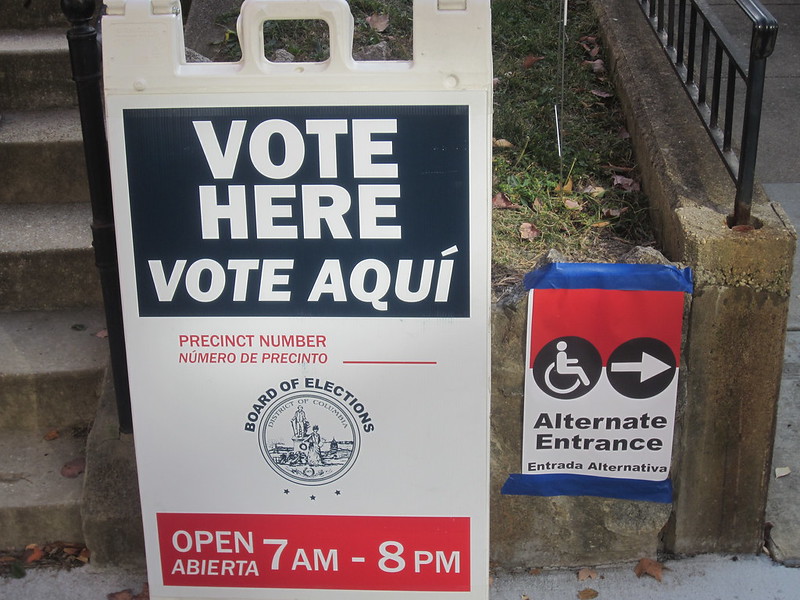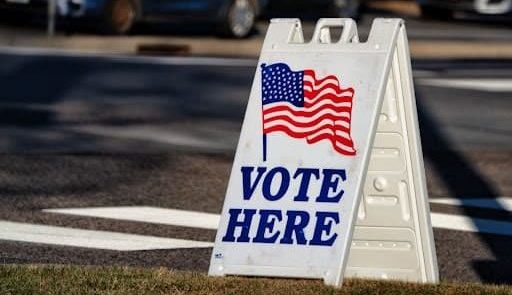This article was featured in the May 13 digital-only edition of Street Sense. Until it is safe to resume person-to-person sales, you’ll always be able to find the current digital-only edition at streetsensemedia.org/Digital Thank you for reading! Please continue to support our vendors through our mobile app (streetsensemedia.org/App).
W
ith Washington, D.C.’s primary elections fast approaching, the voice of the District’s homeless population is at an even higher risk than usual of being left out at the voting booth, thanks to limitations brought on by closures related to the coronavirus.
In the face of the pandemic, the D.C. government is pushing residents to vote by mail across the board. However, people without a permanent address may not know they are eligible to register and participate remotely. Organizations that serve homeless communities are taking steps to revamp their own outreach to raise awareness with potential voters.
But some advocates worry the absence of face-to-face meetings between them and the people they serve, as well as the extra steps involved in registering to vote by mail without a stable address, are going to harm voter turnout.
Betty Gentle, an advocacy and engagement specialist at the nonprofit So Others Might Eat, said normally she would go in person to SOME’s dining hall and speak directly to people there to answer questions about who’s eligible to vote, where they can vote, and sometimes even help people fill out their registration. Now, with social distancing guidelines in effect, that’s not an option.
“We’re basically relying on paper, paper flyers, and phone information, and some emails. It is really difficult,” Gentle said. “You already don’t really know what’s sticking with people, but now you really just throw it out there in the wind.”
The nonprofit Bread for the City is encountering similar problems, according to its CEO, George Jones. In past years, the organization might have had a table set up in the lobbies of the buildings they operate with voting information. Such interpersonal interactions are “not a thing” this year, Jones said.
Instead, Bread for the City is giving out packets of information along with the bags of groceries they hand out. The organization’s food pantries fed more than 25,000 people last year, according to its annual report. Volunteers were brought on to provide delivery of food during the pandemic. Jones said the organization is hoping to address common questions people have, including who is eligible to vote and where to go to vote.
To get the word out to the homeless community, the District Board of Elections has similarly been distributing flyers through the Mayor’s Office of Community Relations and Services at sites where hot meals and groceries are provided.
For people who may struggle to vote by mail, including people experiencing homelessness, a small number of in-person voting sites will still be available. Instead of the usual 143 polling precincts, the District’s early-voting locations will be repurposed into 20 voting centers, with two or three in each ward. The centers will be open continuously from May 22 to June 2, with the exception of Memorial Day, including the weekend and Monday before the election when early voting is normally closed.

The deadline to register to vote remotely was May 12. Voters who are already registered have until May 26 to request a mail-in ballot. In-person registration will be an option at the 20 voting centers through the last day of the election.
“Anybody who lives anywhere in the city can vote in any voting center [and] can same-day register,” said Rachel Coll, a spokesperson for the Board of Elections
When asked why ballots could not be given directly to voters at the meal sites where flyers about ballots are being distributed, Coll said it would take “years” to create a system of automatic ballot mailing and distribution of the kind that would allow the Board of Elections to distribute ballots directly through partners like SOME.
“We consulted a number of national partners on this point, and determined that the only way to effectively administer this election was to use our already existing and established ballot request process.”
Megan Hustings, the interim director of the National Coalition for the Homeless, said that from a national perspective, D.C. has relatively relaxed rules on voting, making it more accessible for homeless people. “Voting is also something that D.C. is definitely trying to make available for everybody and make sure everybody stays safe in their voting,” she said. Councilmember Robert White, for instance, introduced a bill in 2019 that would restore the right to vote for incarcerated people in D.C., and Councilmember Charles Allen wrote legislation in 2018 that would have expanded the right to vote in local elections to D.C. residents as young as 16.
Some of the recommendations Hustings offered for cities expanding their voting access, like increasing the number of hours voting locations are open for, are things the District government is already doing, though she added ID restrictions could be relaxed across the board.
[Read more: District of Columbia Expands ID Assistance, Voter Access]
“[ID cards] are something that is commonly lost, and even if you haven’t lost it, [it’s] something that goes out of date. When you’re moving around, you don’t have a permanent address, it’s hard to get all the documentation you need to update IDs,” she said, noting that the District only requires either a DMV-issued ID, a utility bill, or any other government-issued ID, which is still generous compared to other states. There are also ID clinics in DC that can help homeless people with no official identification obtain a temporary ID from the DMV that is valid for voting.
By contrast, some states require a photo-ID at the time of voting. In Virginia, for example, laws require that voters show a photo-ID when they vote or vote on a provisional ballot and provide photo-ID within the next three days, earning the state a “strict” rating from the National Conference of State Legislatures.
Local advocates remain concerned about the logistical hurdles for the homeless community while public resources like libraries and many other social service providers are closed.
“I have a smartphone. I requested [my ballot] through my smartphone, [but] everybody doesn’t have a smartphone, everybody doesn’t have a computer. Everybody is not going to be able to make their way to the Board of Elections to drop off their ballot form,” Gentle said. “The mechanisms they’re trying to use, they’re not low-barrier.”
People experiencing homelessness are allowed to use shelters and locations like SOME as their address to register to vote, but Gentle said that only about a quarter of the usual crowd is coming to SOME everyday. Either due to enforced quarantines or fear of crowded areas, many people may choose not to come to pick up their ballot, even if it were delivered in the mail.

Gentle and Jones also described misconceptions and apathy toward voting they have found to be common among people experiencing homelessness and difficult to dispel without face-to-face interactions.
Gentle said she struggled to persuade people at SOME that in jurisdictions where one party is dominant, like the Democrats in D.C., participating in the local primary to choose who will be that party’s candidate for a specific position in November is often more important than the general election.
“It may just not even be something that’s on people’s minds,” she said. “I think a lot of people are focused on the general election because of the presidential election.”
Seventy-six percent of D.C. voters were registered Democrats as of April 30. The only competitive races in the primary this year are for the Democratic nomination, with as many as eight candidates sparring over one seat, in the case of the Ward 2 D.C. Council race.
“For people experiencing homelessness, for people of color in particular, whether they’re experiencing homelessness or not, there’s a level of cynicism about voting that’s understandable because, to be honest with you, quite often, even when we vote, the kind of policies that come out still don’t really represent our needs,” Jones added.
He said Bread for the City uses face-to-face interactions to make the case that voting is a way for people experiencing homeless to get the policy outcomes they want to see, especially with regard to housing.
“Obviously, there’s a natural nexus between people experiencing homelessness and what’s happening in public policy around housing,” Jones said. “[The challenge is] getting people to realize that this is one of the places to try to exert some influence over an issue that is particularly relevant to their own lives.”
Due to the coronavirus pandemic, those interactions are not possible anymore. The cumulative effect, Gentle said, is that she expects a decreased voter turnout in June’s primaries from D.C.’s homeless population.
“All the councilmembers are talking about [the primary] on Twitter, DCBOE is talking about it on Twitter, it’s almost an assumption that everybody has a smartphone or Wi-Fi, or a computer and can easily submit the absentee form and have it mailed to their house,” she said. “We know that’s not true.”





